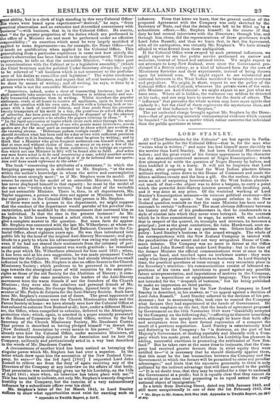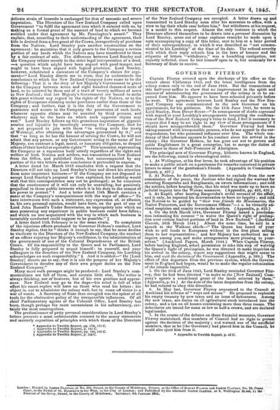LORD STANLEY.
All "Chief Secretaries for the Colonies" are but agents in Parliament and in public for the Colonial Office—that is, for the man who "writes what is written ;" and none has lent himself more slavishly to the service than Lord Stanley. He had been Colonial Minister once before ; and the great event of his former appearance in the character was the miserably-contrived measure of Negro Emancipation ; which first attempted to settle the question of Negro Slavery by halves, and then huddled it up in a hurry. It will not be forgotten that Lord Stanley, after proposing to lend the West Indian planters fifteen millions sterling, came down to the House of Commons and made the fifteen millions twenty and the loan a gift. On the surface, this might seem an act of surpassing benevolence to the West Indian planters : not much of that—the object was to drive a bargain, to carry a point which the powerful Anti-Slavery interest pressed with headlong zeal, and it was done at any price. Of the wretched working of Lord Stanley's Emancipation measure—its ruinous political economy—this is not the place to speak : but its cognate relation to the New Zealand question reminds us that the same Minister has been used to succumb to certain "influences." The most obvious difference between his history and that of his predecessors is, that he condescends to a style of combat into which they never were betrayed. In the contests which he is thus commissioned to wage, he enters with such ardour, that in respect of the quarrel, its triumphs and reverses, he becomes principal ; just as the great condottiere, Sir John Hawkwood, once engaged, became a principal in any partisan war. Others look after the policy: Lord Stanley's business is the armed struggle. The whole of his correspondence with the New Zealand Company is tainted with the peculiarities of the smart and not very scrupulous House of Commons debater. The Company was no more in favour at the Office under Lord John Russell than under Lord Stanley : but in the time of the former Minister the official communications went at once to the subject in hand, and touched upon no irrelevant matter : they were really what they professed to be—letters on business. In Lord Stanley's time, the practical questions at issue occupy a very secondary place in the Secretary's attention : his communications consist of laboured expositions of his views and intentions to guard against any possible future misrepresentation, and imputations of motives to the Company, couched in supercilious or epigrammatic language. They are letters not intended for the "despatch of business," but for being published to make an impression on third parties. The first letter addressed by the New Zealand Company to Lord Stanley is described, in his answer, as "an appeal against a decision of Lord John Russell." Lord Stanley adhered to the decision of his predecessor; but in announcing this, took care to remind the Company what favours they had experienced at the hands of Government. He dwells with emphasis on the fact, that the heads of agreement proposed by Government on the 18th November 1840 were "thankfully accepted by the Company on the following day,"—affecting to discover something extraordinary in the speedy answer, although he knew that both offer and acceptance were the mere formal expression of a compact the result of a previous negotiation. Lord Stanley is ostentatiously kind and flattering to the Company : he "is desirous, on the part of her Majesty's Government, of dealing equitably and liberally with a Corn. pany which has made great, and hitherto, his Lordship has pleasure in adding, successful exertions in promoting the settlement of New Zealand." But he takes care at the same time to insinuate, that the Corn. pony had received greater favours than in strict equity they were entitled to—" it is necessary that he should distinctly apprize them, that this must be the last transaction between the Company and the Government in which the former will be permitted to claim any peculiar advantages ;" and hints that his excessive generosity to them is only palliated by the indirect advantage that will have accrued to the public —" It is no doubt true, that they may be enabled for a time to undersell the Government at a profit; but it is equally clear that they cannot do so without at the same time promoting to an equal extent the really national object of immigration."* In a letter from Downing Street, dated atu 10th January 1843, and still more unequivocally in one of date the 1st February 1843, this • Mr. Hope to Mr. Senses, 24th May 1842. Appendix to Twelfth Report, pp.99C it HQ. delicate strain of inuendo is exchanged for that of sarcastic and severe imputation. The Directors of the New Zealand Company called upon Government "to fulfil the agreement into which it entered with us, by Snaking us a formal grant of the amount of land to which we become entitled under that agreement by Mr. Pennington's award." They explain, that, according to their understanding of the agreement, their title is derived from a free grant of the Crown, irrespectively of purchase from the Natives. Lord Stanley puts another construction on the agreement: he maintains that it only grants to the Company a certain portion of any lands which the Natives may have transferred to them by a fair contract of sale. The difference between Lord Stanley and the Company relates merely to the strict legal interpretation of a deed, —a question which might have been argued with good temper, and ought to have been argued with logical precision. Lord Stanley, however, substituted a caricature of the Company's claims for argument—" Lord Stanley directs me to state, that he understands the conclusions to which the New Zealand Company have come to be the following : That it is the duty of her Majesty's Government to grant to the Company between seven and eight hundred thousand acres of land, to be selected by them out of a tract of twenty millions of acres in New Zealand ; that her Majesty's Government are bound to make this grant without any regard to the rights of the Natives, or to the rights of Europeans claiming under purchases earlier than those of the Company ; and further, that it is the duty of the Government to guarantee and secure to the Company the possession of such lands, whatever opposite claims may be asserted by third persons, and whatever may be the basis on which such opposite claims may zest." Lord Stanley follows up this gratuitous imputation of gigantic avarice and injustice by tauntingly assuring the Company, that be is not prepared to join with them "in setting aside the treaty of Waitangi, after obtaining the advantages guaranteed by it ;" and that "as long as he has the honour of serving the Crown, he will not -admit that any person, or any Government acting in the name of her Majesty, can contract a legal, moral, or honorary obligation, to despoil others of their lawful or equitable rights." This summary, representing the Company as a rapacious body utterly regardless of the rights and welfare of both Natives and settlers, was transmitted to New Zealand from the Office, and published there, but unaccompanied by any portion of the two letters whose conclusions it pretended to express.
A letter dated 1st March 1843 concludes with a request that the Directors will not take up Lord Stanley's time and divert his attention from more important business—" If the Company are not disposed to accept Lord Stanley's proposal as thus explained, his Lordship would wish that this correspondence may not be prolonged; as be conceives that the continuance of it will not only be unavailing, but positively prejudical to those public interests which it is his duty to the utmost of his power to protect." -IAnd a letter dated 15th March contains a sneer at the Company's unacquaintance with the ways of office—" To have interwoven with such a statement, any expression of, or allusion to, his own personal opinion, would have been, on the part of one of Lord John Russell's Under Secretaries, an impropriety into which no man possessing any experience in public business could have fallen ; and which no one acquainted with the way in which such business is invariably conducted could suppose to be possible."
A letter dated 15th February is in the same strain. To complaints of the injurious effects produced by Governor Hobson's conduct, Lord Stanley replies, that he "thinks it enough to say, that he must decline to vindicate to the Directors of the New Zealand Company, the conduct of an officer enjoying her Majesty's confidence, in the administration of the government of one of the Colonial Dependencies of the British Crown. Of his responsibility to the Queen and to Parliament, Lord Stanley is fully prepared to acquit himself: to yourself, and your colleagues in the direction of the New Zealand Company, his Lordship acknowledges no such responsibility." § And it is added—" He [Lord Stanley] directs me to say, that it is not the purpose of her Majesty's Government to devolve any of their own proper duties on the New Zealand Company."
Many more such passages might be produced : Lord Stanley's communications are full of them, and contain little else. The writer is always thinking, not of business, but of his own position and appear-ance. New Zealand may go to the dogs—his mind is full of what effect his smart replies will have on those who read his letters : his object is, not to administer the colony well, but to come off victor in a war of words. A Secretary of State thus occupied was the aptest of all tools for the obstructive policy of the irresponsible influences. Of all chief Parliamentary agents of the Colonial Office, Lord Stanley has been, though perhaps the most unconscious in his subserviency, certainly the most unscrupulous. The predominance of petty personal considerations in Lord Stanley's letters presents a most unfavourable contrast to the massy statements and masterly exposition of principles with which those of the Directors
• Appendix to Twelfth Report, pp. 170,171 C. 1Appendix to Twelfth Report, p. 180 C.
Appendix to Twelfth Report, pp. 185,186 C. Appendix to Twelfth Report, p. 199G.
of the New Zealand Company are occupied. A letter drawn up awl transmitted to Lord Stanley soon after his accession to office, with a view to lay their whole case before him,* but withdrawn at his request, is a model in this respect. Almost the only instance in which the Directors allowed themselves to be drawn into a personal discussion by Lord Stanley, arose out of some captious remarks he made upon a note accompanying a copy of this letter, sent to him at a later period of their correspondence, in which it was described as "not communicated to his Lordship" at the time of its date. The refined severity with which their reply schools him in the laws of honour and the etiquette of letters "withdrawn," was a humbling castigation, not unjustly inflicted, since he laid himself open to it, but unseemly for a Secretary of State to receive.























































 Previous page
Previous page